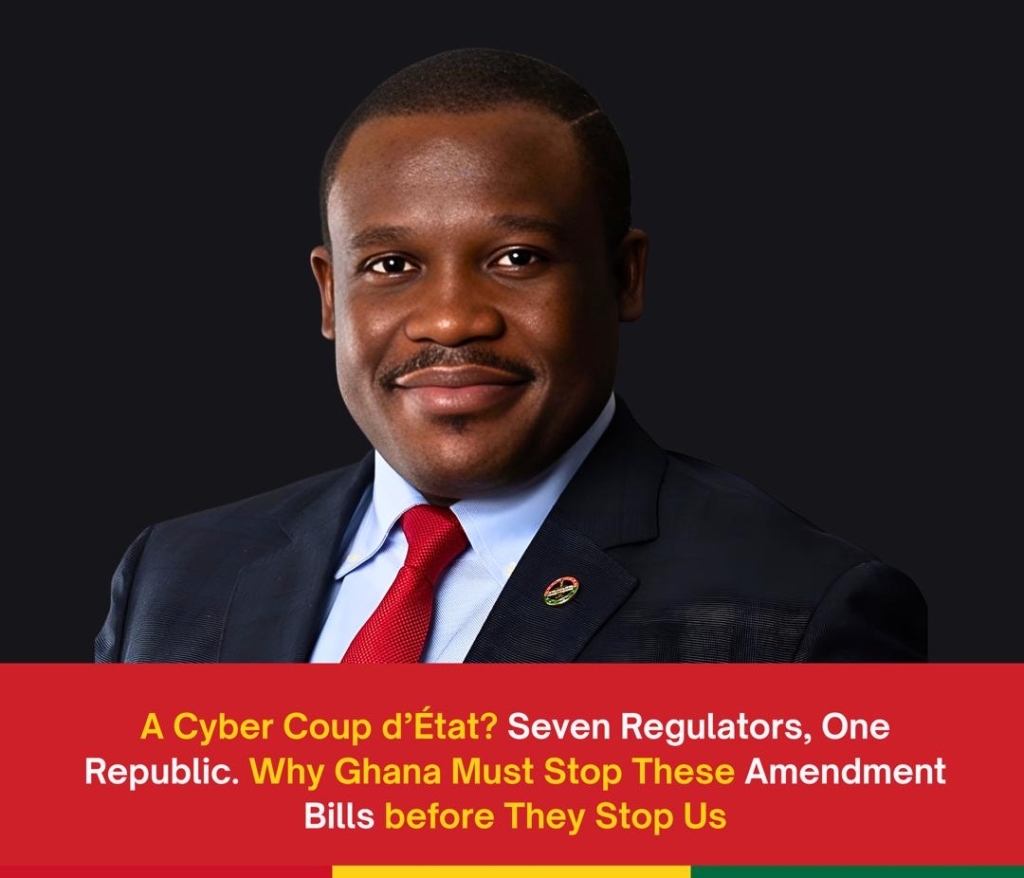
There is something stirring quietly in the corridors of our Republic. A revolution not of tanks and bayonets, but of legal clauses and agency mandates. It arrives wrapped in good intentions and stamped with urgency.
It speaks the language of artificial intelligence, data harmonisation, cybersecurity, innovation, and digital literacy.
On paper, Ghana is modernising. In reality, something far more dangerous is taking shape.
While citizens worry about electricity, livelihoods, and the rising cost of living, Parliament is being handed a maze of draft laws so complex that even seasoned experts struggle to map the exits.
Behind the gloss of digital transformation lies a Frankenstein architecture of power: multiple technocratic agencies all claiming authority over the same technologies, the same data, the same future.
Who controls AI?
Three separate bills each answer: “Me.”
Who governs data?
Two different regulators each respond: “I do.”
Who holds power over security and innovation?
Four institutions step forward at once.
In this legislative chaos, technology itself becomes a jurisdictional battlefield.
Ghana is building a many-headed digital regulator. A creature with seven mouths issuing directives and zero ears to listen. A beast guaranteed to confuse innovators, suffocate start-ups, and scare investors into silence.
A bureaucracy so layered that no one will ever be sure whether a digital pioneer must seek permission from the Data Protection Commission, the Cybersecurity Authority, NITA, the National Communications Authority, a new Emerging Technologies Agency, or an institute yet to be built.
We are sleepwalking into paralysis.
Instead of one clear national strategy for technology, Ghana is creating a fortune-draining competition between state bodies. Instead of efficiency, conflict. Instead of progress, a procedural traffic jam.
And the price will be paid by the young people we claim to empower. Imagine a brilliant Ghanaian engineer designing a tool that could change agriculture or health care. Before she writes a single line of code, she must navigate licensing, ethics approvals, data permissions, cybersecurity certification, and innovation oversight.
Each step required by a different regulator with a different rulebook. Delay becomes a business model. Compliance becomes a punishment. Vision dies.
In whose interest is that?
There is a lesson Ghana keeps failing to learn. When institutions fight for power instead of purpose, citizens suffer. When technocrats build empires instead of systems, democracy pays. When the Executive multiplies agencies without clear supremacy or coordination, accountability disappears.
Yes, we need strong data protection. Yes, we must secure our critical infrastructure. Yes, we must prepare for AI, quantum, and the digital economy. This is not a call to abandon the future. It is a call to design it with coherence and democratic intelligence.
The question is simple: Will Ghana own her digital future… or be owned by the confusion she creates?
We deserve one transparent, streamlined, accountable framework.
Not seven fiefdoms fighting for relevance.
We deserve innovation supported by clarity, not smothered by contradiction.
We deserve technology governed by rights and freedom, not by opacity and overlapping mandates.
We must pause. Review. Consolidate. Amend. Build wisely. Our policymakers must defend the interests of citizens and innovators, not the expansion of regulatory turf.
A digital republic cannot be built on legislative chaos.
Ghana’s future will be determined by the laws we pass today. The question each MP must answer is unavoidably personal and profoundly patriotic:
When tomorrow’s Ghana is automated, interconnected, and intelligent, will the sons and daughters of this nation find room to invent, to build, to question and to thrive? Or will they be trapped in a labyrinth of agencies more powerful than Parliament itself?
The future has arrived at our doorstep, asking: Who is really in charge here?
We must ensure the answer is: The Ghanaian people.
DISCLAIMER: The Views, Comments, Opinions, Contributions and Statements made by Readers and Contributors on this platform do not necessarily represent the views or policy of Multimedia Group Limited.
DISCLAIMER: The Views, Comments, Opinions, Contributions and Statements made by Readers and Contributors on this platform do not necessarily represent the views or policy of Multimedia Group Limited.
Source: myjoyonline.com










